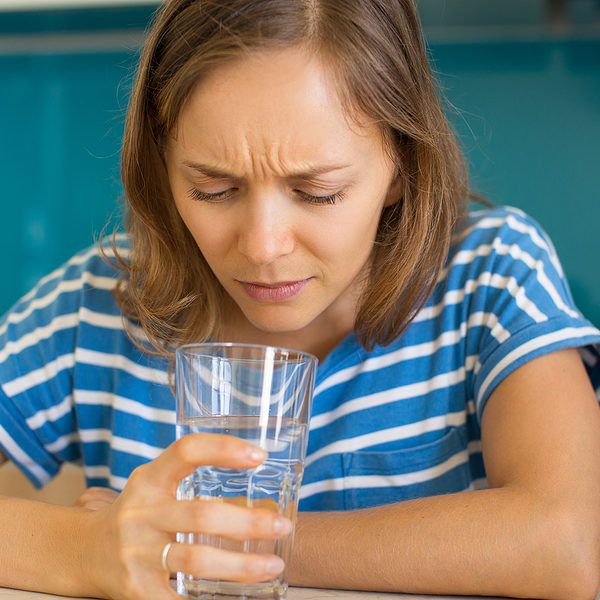Solutions To Better Drinking Water at Home
Like most Americans, you rely on bottled water because you don’t like the taste or trust the safety of the water coming out of your faucet. According to Statista, bottled water sales in the United States rose from 8.25 billion gallons in 2006 to 15 billion in 2020. Furthermore, the average household spends approximately $1,500 yearly on bottled water. The fact is that most people consider bottled water to be better tasting and safer than tap water. In this post, we look at the common problems with tap water and the solution to fix them.
 Common Problems With Household Drinking Water
Common Problems With Household Drinking Water
Odor
People often complain about the odor of their tap water. In most cases, chlorine is to blame. Chlorine is added to municipal water supplies to kill bacteria, viruses, and other microorganisms.
The U.S. Environmental Protection Agency limits the amount of chlorine allowed in tap water, ensuring that it’s safe to drink; however, it doesn’t change the fact that people dislike the odor and prefer bottled water instead.
Another odor people regularly complain about is sulfur or a rotten egg smell caused by hydrogen sulfide or sulfate-reducing bacteria in the groundwater.
Taste
Tap water can taste different from locale to locale. Whether you’re using well water or getting it from a municipal supplier, your water probably has a distinctive taste. The most common “flavors” of tap water are fishy or earthy, bleach, metallic, and salty. Many things affect how your water tastes, including the mineral content, contamination, bacteria, and your plastic pipes. If you’re like most people, you prefer your water to have a neutral or no flavor and probably rely on bottled water instead of the water coming from the faucet.
Color
Another problem people occasionally experience with their tap water is its unusual color. If your water comes out from the faucet clear but turns brown, orange, or red, it could be caused by dissolved iron or corroded pipes. Furthermore, if your water has black specks, it could be from manganese dissolved from nearby bedrock or mining.
Mineral Deposits
Water that contains a high amount of minerals like calcium and magnesium is called hard water, and it’s another typical problem homeowners face. While hard water isn’t dangerous to drink, it can wreak havoc with your plumbing and appliances and make everyday tasks like bathing and washing clothes a chore. Moreover, hard water leaves behind unsightly stains in your sinks and tubs, causes water spots on washed dishes and silverware and can shorten the lifespan of appliances like coffee makers, washing machines, and dishwashers.
Contaminants
We’ve all heard the stories coming from Flint, Michigan, and its water issues, and it’s normal to wonder whether your water is safe to drink. As mentioned, there are chemicals in your tap water, but the question is: are they at dangerous levels? According to EWG.org, their Tap Water Database reveals, That when some Americans drink a glass of tap water, they’re also potentially getting a dose of industrial or agricultural chemicals linked to cancer, brain, and nervous system damage, fertility problems, hormone disruption, and other health harms.
The EPA lists numerous possible contaminants that find their way into drinking water, including:
– Organic material
– Chemical contaminants like nitrogen, bleach, pesticides, bacteria, and toxins
– Biological contaminants like microbes, microorganisms, protozoa, and parasites
– Radiological contaminants like cesium, plutonium, and uranium
As you can see, there are many good reasons to dislike your tap water, but there is something you can do to improve your water odor, taste better, and be safer to drink.
 How To Get Better Drinking Water At Home
How To Get Better Drinking Water At Home
If you want better water from your tap and kick the bottled water habit, here’s how to do it.
Water Filtration
Whether you get your water from a city supplier or a well, you can benefit from a water filtration system. Household water filters remove dissolved solids, contaminants, bacteria, and viruses with reverse osmosis technology. Reverse osmosis filtration removes up to 99% of contaminants, including chlorine, lead, PFOA/PFOS, and other impurities, for healthier, better-tasting, and smelling water.
Water Softeners
If you’re happy with the look, smell, and taste of your water but are concerned about the mineral deposits left behind, a water softener may be right for you. Water softeners remove elevated levels of dissolved minerals like calcium and magnesium that cause hard water and the problems that go with it. Installing a water softener will make your plumbing and water-based appliances last longer; give you spot-free dishes after washing, and make your skin and hair feel better.
About Atlantic Coast Water Clinic
At Atlantic Coast Water Clinic, we have years of experience installing and servicing water softeners, filters, and commercial water systems. We’re a trusted company in the South Florida, and our reputation is second to none. If you’d like more information about our products or want a quote, contact us at 772-283-4767 or fill out our online form.


 772-283-4767
772-283-4767